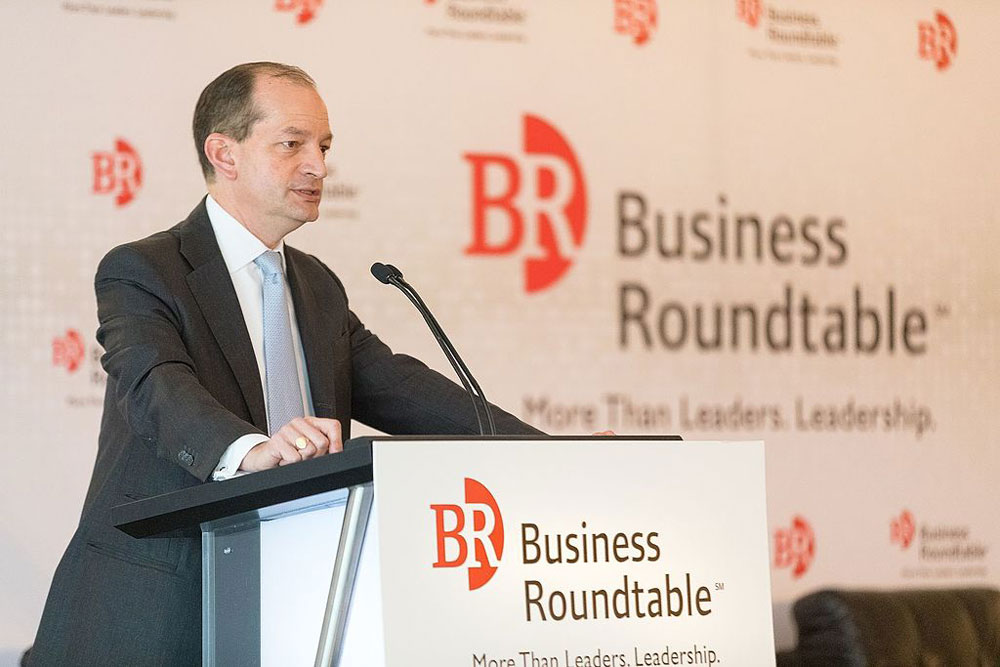
April 13, 2020; New York Times
The Business Roundtable’s “Statement on the Purpose of a Corporation” drew headlines when it was issued last August. The organization, whose membership comprises chief executive officers of America’s leading companies, drew praise for recognizing their companies’ responsibility went beyond their bottom lines. “Americans deserve an economy that allows each person to succeed through hard work and creativity and to lead a life of meaning and dignity,” they proclaimed. Some saw this as a turning point in the effort to create a humane society that cares for all its citizens.
With much of the nation now locked down and business activity severely curtailed, Corporate America is being given a chance to put these principles to work at a time when social responsibility would matter. Early indications are that for many of the signatories, their words were hollow, and they have prioritized their own profitability over a broader responsibility to their employees and their communities.
In a statement about the COVID-19 crisis, they recognize the need for action to support those most effected by the economic harm of the virus. “Members who remain financially able to do so are stepping up with voluntary measures to support their customers, employees, suppliers and communities during the crisis.” And some corporations are impressively modeling this, using their resources to avoiding layoffs; “Apple—whose balance sheet boasts more than $100 billion in cash—is paying employees and contract workers like janitors even as stores remain closed.”
But in a letter to the president and congressional leaders, the Business Roundtable, in the name of the same leaders who signed their August statement, advocated for public responsibility before their own. Making no commitment to use their own assets before turning to government support, they called for major actions to bolster the economy and their own bottom lines, including “direct payments…to Americans who need them most,” “paid leave policies,” “employee retention tax credits,” and “a temporary employer payroll tax holiday.”
One among many exemplars of this bottom-line first attitude is Marriott International. CEO Arne M. Sorenson proudly placed his name on that pledge of broad social responsibility. According to the New York Times, over the past two years, the company had profits of more than $3.1 billion.” It was able to increase its shareholders’ value by buying back more $5 billion of its stock and recently paid quarterly dividends totaling $160 million. There’s no doubt the COVID-19 pandemic has hit the hotel business hard. But rather than protect their workforce, many of whom barely earn living wages, they chose to lay off or furlough most of their employees.
From the perspective of that workforce, this lack of concern rang loudly. William Gonzalez, a laid off restaurant worker, told the Times, “They just say: ‘We don’t need you. You are on your own.’”
Sign up for our free newsletters
Subscribe to NPQ's newsletters to have our top stories delivered directly to your inbox.
By signing up, you agree to our privacy policy and terms of use, and to receive messages from NPQ and our partners.
The company has been making billions and billions of dollars, and a lot of that money doesn’t go to pay workers…I thought there was going to be a moment where they say, “OK, we are going to help you.”
Gonzalez’s wife, who also worked for Marriott, adds, “All the executives, Sorenson and the others, they get paid millions every year, and we just get a few dollars. We give our soul to give our best for our company. I try hard to make the rooms beautiful for guests so they will come back. It’s not fair. Marriott doesn’t care about us.”
Across the economy, many profitable corporations follow this pattern. Lawrence Katz, a former chief economist at the Department of Labor and now a professor at Harvard, clearly sees the contradiction between words and actions: “Any company paying dividends now in this situation, or paying bonuses to executives, that’s just clearly violating the norms that the Business Roundtable vowed. It just seems both inappropriate and shortsighted.”
“There’s a lot of lip service in that,” says Katz.
As a recent NPQ article noted, many corporations have responded to the economic crisis and the widespread human pain of this moment with charitable donations. Many of these proved to show more bark than bite, providing the corporation with a good PR opportunity and a tax deduction but offering little in real help for individuals and organizations.
That many corporations do not see a broad social responsibility should not surprise us. Nor should that, even at this dire moment, become our central focus. As Benjamin Martinez observed for NPQ shortly after the BRT statement was issued, “Relying upon the good intentions of corporations to fix society’s problems cannot be the best way to move forward…We should focus instead on addressing the structural problems that normalize this behavior, as well as developing viable economic alternatives.”—Martin Levine













